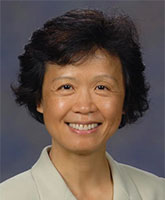Series to Highlight Women in Signal Processing: Dr. Jian Li

 Dr. Jian Li received the M.Sc. and Ph.D. degrees in electrical engineering from Ohio State University, Columbus, in 1987 and 1991, respectively. She is currently a Professor in the Department of Electrical and Computer Engineering, University of Florida, Gainesville. She is also affiliated with the Department of Electronic Engineering and Information Sciences, University of Science and Technology of China, Hefei. Her current research interests include spectral estimation, statistical and array signal processing, and their applications to radar, sonar, and biomedical engineering. Dr. Li's publications include Robust Adaptive Beamforming (2005, Wiley), Spectral Analysis: Missing Data Case (2005, Morgan & Claypool), MIMO Radar Signal Processing (2009, Wiley), and Waveform Design for Active Sensing Systems -- A Computational Approach (2011, Cambridge University Press). Dr. Li is a Fellow of IEEE and a Fellow of IET. She received the 1994 National Science Foundation Young Investigator Award and the 1996 Office of Naval Research Young Investigator Award. She was an Executive Committee Member of the 2002 International Conference on Acoustics, Speech, and Signal Processing, Orlando, Florida, May 2002. She was an Associate Editor of the IEEE Transactions on Signal Processing from 1999 to 2005, an Associate Editor of the IEEE Signal Processing Magazine from 2003 to 2005, and a member of the Editorial Board of Signal Processing, a publication of the European Association for Signal Processing (EURASIP), from 2005 to 2007. She was a member of the Editorial Board of the IEEE Signal Processing Magazine from 2010 to 2012. She is currently a member of the Sensor Array and Multichannel Technical Committee of the IEEE Signal Processing Society. She is a co-author of the paper that has received the M. Barry Carlton Award for the best paper published in IEEE Transactions on Aerospace and Electronic Systems in 2005. She is also a co-author of a paper published in IEEE Transactions on Signal processing that has received the Best Paper Award in 2013 from the IEEE Signal Processing Society.
Dr. Jian Li received the M.Sc. and Ph.D. degrees in electrical engineering from Ohio State University, Columbus, in 1987 and 1991, respectively. She is currently a Professor in the Department of Electrical and Computer Engineering, University of Florida, Gainesville. She is also affiliated with the Department of Electronic Engineering and Information Sciences, University of Science and Technology of China, Hefei. Her current research interests include spectral estimation, statistical and array signal processing, and their applications to radar, sonar, and biomedical engineering. Dr. Li's publications include Robust Adaptive Beamforming (2005, Wiley), Spectral Analysis: Missing Data Case (2005, Morgan & Claypool), MIMO Radar Signal Processing (2009, Wiley), and Waveform Design for Active Sensing Systems -- A Computational Approach (2011, Cambridge University Press). Dr. Li is a Fellow of IEEE and a Fellow of IET. She received the 1994 National Science Foundation Young Investigator Award and the 1996 Office of Naval Research Young Investigator Award. She was an Executive Committee Member of the 2002 International Conference on Acoustics, Speech, and Signal Processing, Orlando, Florida, May 2002. She was an Associate Editor of the IEEE Transactions on Signal Processing from 1999 to 2005, an Associate Editor of the IEEE Signal Processing Magazine from 2003 to 2005, and a member of the Editorial Board of Signal Processing, a publication of the European Association for Signal Processing (EURASIP), from 2005 to 2007. She was a member of the Editorial Board of the IEEE Signal Processing Magazine from 2010 to 2012. She is currently a member of the Sensor Array and Multichannel Technical Committee of the IEEE Signal Processing Society. She is a co-author of the paper that has received the M. Barry Carlton Award for the best paper published in IEEE Transactions on Aerospace and Electronic Systems in 2005. She is also a co-author of a paper published in IEEE Transactions on Signal processing that has received the Best Paper Award in 2013 from the IEEE Signal Processing Society.
We approached her with a few questions:
Q. “Please tell us about yourself and your background.”
I grew up in China. My parents are both engineers. I did well in math, physics, and chemistry in high school. So naturally, I was attracted to the engineering field, although surprisingly, my father wanted me to be a physician. I am glad that I followed my instinct to become an engineer. One of my daughters is also now a senior majoring in engineering.
Q. “Why did you become a full Professor at the University of Florida?”
Picking the academic career was kind of an accident. When I was getting my Ph.D. degree in 1991, the industry job market was tight and I got my first academic job at the University of Kentucky in Lexington. Two years later, I joined the University of Florida in Gainesville.
I love the University of Florida! The university offers majors in almost all disciplines. The faculty and staff are friendly. The fun-loving students are full of energy. The beautiful Gainesville is known as the “tree city”. La Chua Trail and Ichetucknee Springs are natural beauties surrounding the city and are priceless!
Q. “How does your work affect society?”
In early 2000, I, together with my long-time collaborator, Professor Petre Stoica, and several of my wonderful students at that time, got interested in an emerging research topic called multi-input multi-output (MIMO) radar. The topic was fascinating to us since through exploiting waveform diversity, we can achieve a virtual array of length M times N through using M transmit and N receives antennas. We published quite a few papers related to MIMO radar signal processing as well as the first edited book on the topic. Our papers and books on the topic have been highly cited and now MIMO radar has become standard in applications such as the multi-billion dollar automotive radar industry. In hindsight, the decision of focusing our efforts on the MIMO radar signal processing research at that time was a smart move.
Q. “What challenges you had to face to get where you are today?”
Never give up! It is also very important to balance family, career, and personal well-being. It is a personal choice on how to achieve it. Different people have different ways of getting that done. However, everyone should be mindful of it when making career choices.
Q. “What advice would you give to scientists/engineers in signal processing?”
Dare to be different, to be jeered at. Dare to think outside the box. Be honest and sincere in terms of publishing research results that are repeatable and influential.
Q. “Anything else that you would like to add?”
I found so many of the young colleagues nowadays who are much more talented and capable than myself. I wish them the best!

